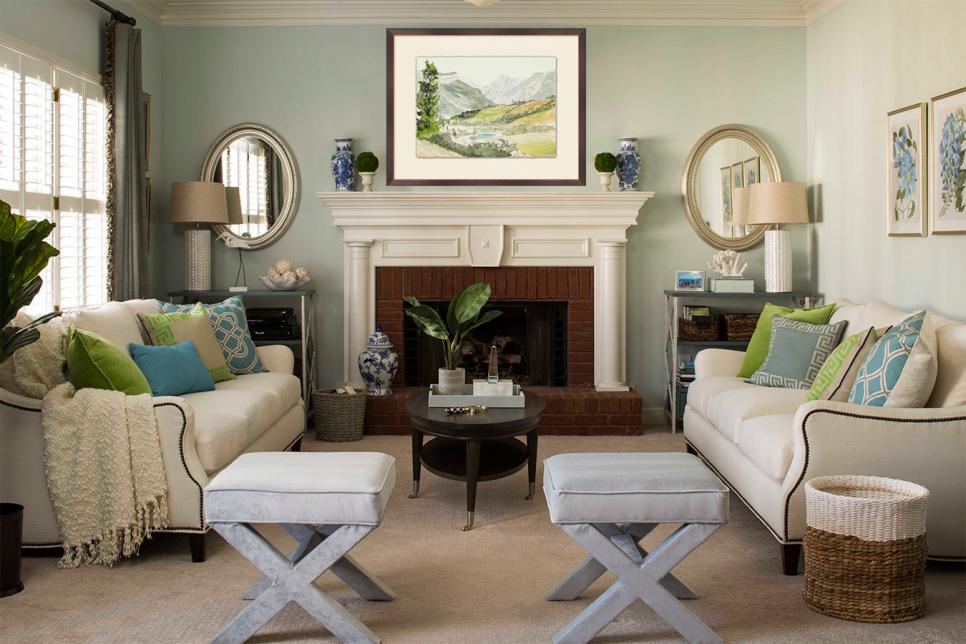Over the past year, our homes became a place of sanctuary amid the stress and anxiety of a global pandemic, so it’s no wonder that many of us are gravitating toward decorating choices that help us feel calm and grounded. Color is an especially powerful tool in creating a soothing environment, and sage green has recently become a must-have hue for those seeking a serene, restful home.
According to Google trend data, search interest in sage green reached a record high this year, with the color currently beating out emerald and mint as the most-searched shade of green. “Sage is a lighter, more muted shade of green, so it creates a calming effect in just about any space in the home,” says Sue Wadden, director of color marketing at Sherwin-Williams. “It also has such strong ties to the greenery and nature that surrounds our home, so it really helps bring the outdoors in and make a space feel more grounded.”
Sage green’s versatility makes it an easy color choice for living areas, bedrooms, kitchens, and bathrooms. “How the color is paired with other colors, textures, and finishes will impact the mood that you create,” says Stephanie Pierce, director of design and trends at MasterBrand Cabinets. The color lends a sophisticated air when combined with bright whites and gold finishes, she says, while darker accents will enhance its ability to create cozy, moody spaces.
How to Decorate with Sage Green
As a mix between gray and green, this calming shade “satisfies both color minimalists and color lovers,” says Nivara Xaykao, a former color marketing and development associate manager at Benjamin Moore. Use these sage green decorating ideas to apply the trendy color to your home.
1. Incorporate sage into a monochromatic palette.
Sage green works beautifully when combined with darker greens in the same color family, says Erika Woelfel, vice president of color and creative services at Behr Paint. For a soothing monochromatic color scheme, start with a light- to mid-tone sage green (Woelfel suggests Behr’s Zen PPU11-14), then go several shades darker for the accent color. Bring in creams and whites for balance, sticking to colors that have slight gray-green undertones for a cohesive look.
2. Paint your kitchen sage green.
Use sage green to inject calm into rooms that tend to feel busy and chaotic. “I especially love sage green in the kitchen—it’s a lively space in the home where people often gather, but it can also act as a retreat for those who love to cook or read a book in a kitchen nook,” Wadden says. Apply large doses of sage green on cabinetry or walls to establish a more peaceful atmosphere in the hub of your home.
3. Balance cool sage with warm accents.
Sage green tends to veer toward the cooler side of the spectrum, so warm-toned accents can help give it a lift. To maintain a mostly neutral color scheme, opt for creamy shades of white and metallics like rose gold to add richness and warmth to the coolness of sage green, suggests San Diego-based interior designer Susan Spath. For a more colorful palette, refer to green’s opposite on the color wheel. “In terms of complementary colors, soft mauves and deep pinks can add depth to a sage palette,” Woelfel says.
3. Give your bathroom a spa-like feel.
The right color scheme can make your bathroom feel like a tranquil retreat where you can unwind at the end of the day. Pierce loves using sage green in bathrooms because the color reminds of eucalyptus leaves, which are often used in spas. To re-create that relaxing atmosphere, apply sage green on bathroom walls and bring in some fresh greenery for natural decor.
4. Accentuate sage green with natural materials.
Drawn straight from nature, sage green feels especially fitting with natural materials. “Many hardwoods and natural stones also have natural green undertones and will work very well within a green palette,” says Roger Higgins, of the Nashville design firm R. Higgins Interiors. Incorporate sage green on walls or furnishings in rooms that feature hardwood floors, butcher-block countertops, stone tile, and other natural finishes. Pairing the color with accessories like sisal rugs or wooden beads and bowls can also help create an organic feel, says principal designer and owner of JL Design Jessica Davis.
5. Make subtle sage green stand out.
To make sage green pop, juxtapose it with a high-contrast color like charcoal gray. “If you pair sage green with a similar-toned taupe or gray, it can get lost, but paired with a charcoal gray or a white, it stands out on its own,” says Kirsten Krason, principal designer and co-owner of the Utah-based design studio House of Jade Interiors. Another way to make a statement with sage green is through luxurious textures. “Sage can be a subdued, humble hue, and so I love it applied to more sumptuous surfaces like a plush velvet or a high-gloss finish for paint,” Xaykao says. Reserve this idea for specific areas you want to highlight, such as the headboard in your bedroom or the kitchen island.
Best Sage Green Paint Colors
For a quick dose of calm, apply these expert-recommended sage green paint colors on walls, cabinetry, furniture, and more.
Evergreen Fog SW 9130, Sherwin-Williams
Wadden suggests Evergreen Fog to create a welcoming and relaxing warmth. The versatile, mid-tone shade looks great in a variety of spaces throughout the home. “I would especially love to use it on all four walls in a bathroom to create the ultimate retreat,” Wadden says.
Juniper Breeze N420-1, Behr
A lighter shade of sage like Juniper Breeze gives rooms a bright, airy look, especially when paired with plenty of white. Woelfel recommends using it to help create a “sanctuary feeling” in bedrooms and bathrooms. Try it in a smaller space to make the room feel more open.
Pewter Green SW 6208, Sherwin-Williams
Pewter Green is a deep, saturated version of sage that makes a bold statement. Wadden loves this color on kitchen cabinets because it adds drama without overpowering. To brighten the dark shade, select warm brass finishes for accessories like cabinet hardware and light fixtures.
Pigeon No. 25, Farrow & Ball
Krason recently used Farrow & Ball’s Pigeon to refresh a laundry room. “The room had no windows or natural light, so this green color did so much to bring in a touch of nature into an otherwise dark space,” she says.
Saybrook Sage HC-114, Benjamin Moore
“Benjamin Moore’s Saybrook Sage gives just enough green for those who are not eager to commit,” Davis says. The muted green features gray undertones that give it an elegant look. Davis recommends this paint color for a study, home office, or sitting room.
Read & Write : write for us
 Lifeyet News Lifeyet News
Lifeyet News Lifeyet News





